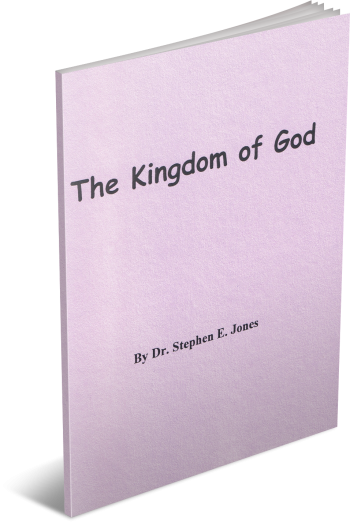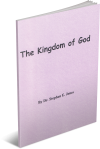Latest Posts
View the latest posts in an easy-to-read list format, with filtering options.

Most people think of the Kingdom of God as being "heaven." The Gospel of the Kingdom is thought to be the same as the Gospel of Salvation. This booklet gives the basic teaching of the Gospel of the Kingdom that is to be preached to all nations before the end comes (Matt. 24:14).
Category - General

The Kingdom of God has territory, which consists of everything God created, whether in heaven or in earth. All that He owns is part of His Kingdom, and He owns the earth by right of creation.
In the days of Moses, when God gave Israel its inheritance in the land of Canaan, God made it clear that the people did not really OWN the land. They were not given sovereign title to the land, but rather they were given authority. This is stated directly in Lev. 25:23, where God says,
23 The land, moreover, shall not be sold permanently, for the land is Mine; for you are but aliens and sojourners with Me.
In other words, the people's use of the land was limited by law. It was not unconditional. If they refused to abide by His laws, God claimed the right to bring judgment upon them and even to evict them from His land (Lev. 26:33).
In other words, Israel's right to the land of Canaan was conditional upon their obedience. It is for their disobedience and rebellion that God eventually cast them out of the land, first by the Babylonians, and later by the hand of Rome.
When God evicted Judah from the land through the hand of King Nebuchadnezzar of Babylon, God again reminded them of His right as Creator to do so. Jer. 27:5 says,
5 I have made the earth and men and the beasts which are on the face of the earth by My great power and by My outstretched arm, and I will give it to the one who is pleasing in My sight.
The earth was created to manifest the glory of God, and His purpose will be fulfilled in the end. God will not fail in His purposes.
The land of Canaan was a type and shadow of a much greater fulfillment yet to come. Think of Canaan as a scale model that was designed to show us God's intent for the entire earth. He is not merely the God of Canaan, and not merely the God of Abraham, Isaac, and Jacob, but is “the God of the whole earth” (Isaiah 54:5).
The Old Covenant was the first method which God set forth to bring about His purpose. It was designed to fail, because God intended for men to learn their limitations. The Old Covenant put the responsibility upon man to be obedient to God and thereby establish the Kingdom through his own effort, his own will, and his own ability to fulfill his promise to be obedient (Ex. 19:8). Their confidence in the flesh had to be broken by real experience.
First Israel and then Judah failed and were evicted from the land. God then established a New Covenant in which God took the responsibility upon Himself to bring righteousness into the earth. In the New Covenant, God says, “I will” and “you will.” It contrasts with the Old Covenant which said, “IF you.” The fulfillment of the New Covenant depends upon God’s ability, not upon man’s ability.
Further, the territory of the Kingdom was increased from a small strip of land in Palestine to the entire earth.
When God evicted Judah from Canaan in the days of Jeremiah, the people at first thought that this was to be a mere 70-year captivity, after which time the people would return, and life would return to what it was in earlier times. But Nebuchadnezzar's dream in Daniel 2 revealed that Babylon was only the “head of gold” on a much larger image. That image represented a much longer captivity that would continue to the end of the age.
And so, when Judah's 70-year captivity to Babylon ended, they found themselves under the dominion of the Medes and Persians for another two centuries. Medo-Persia formed the two “arms of silver” on Nebuchadnezzar's dream-image. This phase was followed by Greece—the belly of bronze—and finally by Rome's “legs of iron.” Furthermore, Daniel himself saw in a vision that Rome's time would be extended in a different way by a “little horn” (Dan. 7:8, 20), which was fulfilled by Papal Rome after the fall of Imperial Rome in 476 A.D.
Daniel saw only a brief outline of history in this succession of empires, but he did see that, in the end, the saints of the Most High would be given the jurisdiction and authority in the earth. Only then would this long captivity actually end. And when we turn to the New Testament, we find that the saints would be given authority, not by the power of the first covenant, but rather the New Covenant.
God would also use this Babylonian succession of empires to unite the earth, even as Nimrod, Babylon's founder, had attempted to unite mankind by conquest at the beginning (Gen. 11:4). God has thus used Babylon's intent for His own purpose—to enlarge the scope of the Kingdom to include the whole earth. That way, when God overthrows Babylon, He is able to take all of its assets at one time and thus lay claim to the whole earth.
And so, while Christians may become alarmed at Babylon's attempt to bring about a one-world government, a one-world religion, a global economy, and to destroy national borders, those who understand the divine plan and who believe in the sovereignty of God are able to watch these developments without fear.
They know that all of this is part of God's Master Plan, and that God is using the Babylonians (as He used King Nebuchadnezzar) as His servants (Jer. 25:6). They are God's unwitting employees, called to organize the kingdoms of this world on behalf of the Kingdom of God. When their work is done, God will take what they have built, regulate it according to His own law, and incorporate it into His Kingdom. Rev. 11:15 says,
15 And the seventh angel sounded; and there arose loud voices in heaven, saying, “The kingdom of this world has become the kingdom of our Lord, and of His Christ; and He will reign for the ages of the ages.”
Jesus said that His faithful servants, who did not oppress others, will be given authority over His house. Luke 12:42-44 says,
42 And the Lord said, “Who then is the faithful and sensible steward, whom his master will put in charge of his servants, to give them their rations at the proper time? 43 Blessed is that slave whom his master finds so doing when he comes. 44 Truly I say to you, that he will put him in charge of all his possessions.”
We see here that the “faithful” servants will be put in authority over “all His possessions.” In other words, they will rule over other people who did not qualify to be rulers. The criteria of rulership given is in terms of treating other people with love and kindness, rather than with injustice and oppression. We qualify by our manner of life in this present age.
Daniel 7:27 calls these rulers, “the people of the saints of the Most High.” They are given jurisdiction in the Kingdom of God in the age to come when the Stone Kingdom smashes the image of Babylon upon its feet. We also read in Rev. 5:10,
10 And Thou hast made them to be a kingdom and priests to our God; and they will reign upon the earth.
Who will these “saints” be? Christian Zionism says they will be Jews who will be converted at the last minute. The New Testament makes it clear that they will be Christians—and not just Christians, but the overcomers. They are the ones who have made the full journey through Passover and Pentecost. They are the ones who had caught the vision of going beyond Pentecost into the feast of Tabernacles, regardless of their genealogical heritage.
The idea that Jews will be able to convert to Christ and then immediately qualify for rulership in the Kingdom is absurd. Such an idea is based upon the mistaken belief that one’s genealogy is sufficient to be a ruler in the Kingdom of God. They assume that the Jews are Israel, and that a mere Passover experience will qualify them to rule the world. That is not Scriptural.
God has broken down the middle wall of partition/division and is in the process of creating “one new man” in Christ (Eph. 2:15). That new man is a corporate man, having Jesus as its Head and the overcomers as its Body. All become part of that Body in the same manner, regardless of their genealogy. All must be justified by Passover, sanctified by Pentecost, and glorified by Tabernacles in order to qualify in time for the first resurrection.
Paul also depicts this “one new man” as a corporate temple, built upon the Apostles and Prophets, having Jesus Christ as its Chief Cornerstone. Regardless of how it is pictured metaphorically, the underlying truth revealed is that it is based upon one's relationship to Christ.
Rev. 20:6 says that these overcomers will reign with Him a thousand years until the end of the Sabbath “day” (millennium). This will bring to a close the first “week” from Adam. And then the next great phase of the divine plan will begin, in which all the dead will be raised, judged, and all unbelievers put in subjection to the Body of Christ. They will all bow to Christ and confess Him as Lord at that time (Phil. 2:10, 11). Further, “no one can say ‘Jesus is Lord’ except by the Holy Spirit” (1 Cor. 12:3).
This will be their Passover experience (justification by faith), for they will all become believers at that point. But they must then learn righteousness through Pentecost in the final Age to come, until the Creation Jubilee, when all creation will experience the freedom of the Sons of God.